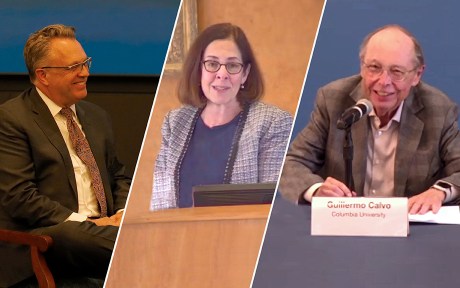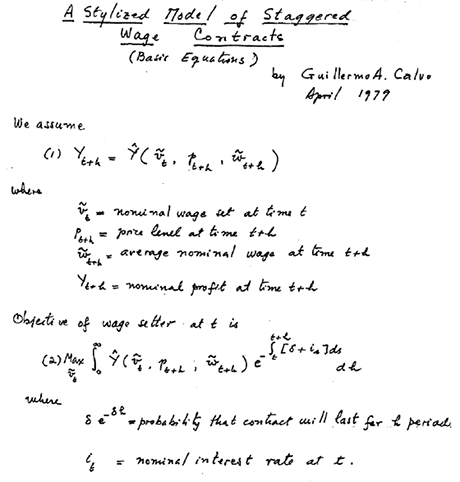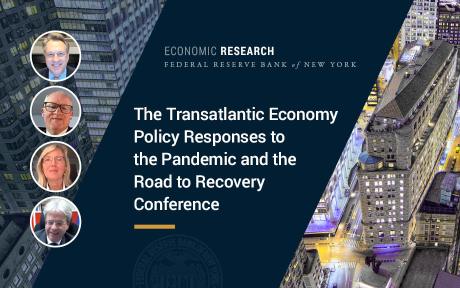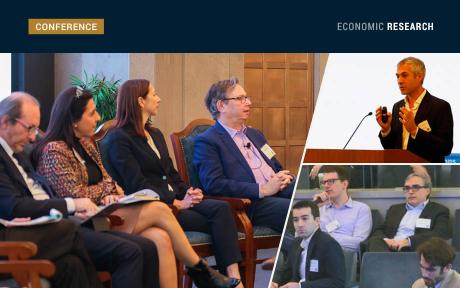
Guillermo Calvo is a leading member of a group of economists who revolutionized macroeconomics by modeling how incentives and the anticipation of future policies affect aggregate outcomes. In celebration of his work, a conference was held in his honor at the Federal Reserve Bank of New York and at Columbia University on February 22-24, 2023. The conference program can be found on the event website. A longer version of this post with additional detail on the proceedings can be found here.
Panel Discussion Highlights
The conference celebrated the 45th anniversary of the publication of Calvo’s 1978 paper “On the Time Consistency of Optimal Policy in a Monetary Economy.” The paper showed how a conflict between the interests of the current government and those of a future government gives rise to a credibility problem. This seminal paper kickstarted a broad research agenda, which includes, for example, the problem of inflation stabilization and the design of sustainable public debt management strategies. The conference also celebrated Calvo’s 1983 paper “Staggered Prices in a Utility-Maximizing Framework”—the paper behind the term “Calvo Pricing.”
The policy panels at the conference reflected Calvo’s practical interest in the emerging economies of Latin America. Inflation was the focus of attention for most panelists.
- New York Fed President John C. Williams reiterated the Federal Reserve’s commitment to the 2 percent inflation target and stressed the importance of keeping expectations anchored.
- St. Louis Fed President James Bullard argued that this anchoring of inflation expectations makes analogies with the Volcker disinflation misguided. The Federal Reserve had very little credibility back then and, as a result, had to take costly steps that may not be required in the current environment.
- London School of Economics (LSE) professor emeritus Mervyn King analyzed the role of expectations in pinning down the inflation rate and argued that past credibility alone cannot maintain price stability.
- Francesco Giavazzi of Universitá Bocconi discussed the role of fiscal policy in mitigating supply shocks, while LSE’s Silvana Tenreyro stressed that the rise in energy prices was a large terms-of-trade shock. Federico Sturzenegger (Universidad de San Andrés), on the other hand, warned against reading too much into specific shocks, as relative price adjustments cannot be the source of prolonged inflation.
- Jacob Frenkel (Group of Thirty) argued that it is the goal of monetary policy to ensure that shocks are transitory rather than permanent.
- Former Fed Vice Chair Richard Clarida argued that both the Federal Reserve and U.S. fiscal policymakers had the wrong assessment of supply conditions and engineered a demand level that was too high for price stability.
- Pierre Olivier Gourinchas (International Monetary Fund, UC Berkeley) also focused on fiscal policy during the pandemic as a driver of imbalances between nominal spending and actual production, resulting in price adjustments.
The closing policy session was composed of distinguished policymakers in Latin America.
- Ernesto Zedillo discussed his past experience as President of Mexico during a run on Mexico´s public debt and described how Calvo´s academic papers helped Mexican authorities understand and navigate the crisis.
- José Antonio Ocampo, Colombia’s former finance minister, tackled the issue of earning credibility during a time of complexity due to multiple competing shocks.
- Ilan Goldfajn (Inter-American Development Bank) also shared his experience in policymaking to stress the enduring relevance of Calvo’s insights.
Lecture Highlights
Calvo’s colleagues at Columbia— Michael Woodford, Maurice Obstfeld, and John Taylor—and his student Carmen Reinhart gave special lectures during the conference.
According to Michael Woodford, the 1978 Calvo paper is one of the key references in the modern macroeconomic literature, with profound implications for thinking about policy and monetary policy frameworks. Together with the works of Kydland and Prescott, it shows that there are, at least in principle, large gains from commitment in advance to constrain future policy.
Maurice Obstfeld offered his conjecture on the origins of Calvo’s time consistency paper and pursued the implications of this literature for the international monetary system, with special reference to the fact that U.S. public debt serves as the world’s liquid asset. Effectively, the U.S. government is producing and, in some sense, selling the liquidity services of these bonds (the conference keynote presentation by Princeton’s Chris Sims touched on this issue). The credibility problem is central because the safety of these bonds implies a commitment to keep them safe. The presentation by Giancarlo Corsetti (professor, European University Institute) revisited this problem, pointing out that the government’s inability to commit to the safety of its “safe” assets results in welfare losses all around.
Carmen Reinhart’s presentation highlighted the important policy work inspired by Calvo’s contributions in the late 1990s related to inflation stabilization, the determinants of capital flows, contagion, public debt management, the transition of eastern Europe to a market economy, sudden stops, and the Mexican financial crisis.
In his presentation, John Taylor argued that, given the current rate of inflation, to achieve its inflation target of 2 percent the Federal Reserve should continue to tighten monetary conditions. His speech highlighted the value of following a rule as a way to build and maintain credibility, a theme that is present in much of Calvo’s work.
The conference closed with Calvo’s reflections on the three days of discussions, focusing on the lessons he drew from the development of macroeconomics from the mid-1950s to the 1970s. Macroeconomics at the time did not have a framework to think about the future. The dominant model was one with adaptive expectations, and adaptive expectations keep you looking backward. Calvo recalled that he was personally concerned because he was always obsessed with issues of credibility so he could not even formulate the problem. Models with perfect foresight were dismissed because the natural assumption at the time was that prices cannot jump (since they are sticky), so dynamic models with perfect foresight and an initial condition for the price level led to hyperinflations or hyper-deflations even with a constant money supply. It took macroeconomics two decades to grow out of backward-looking economics. The rational expectations revolution helped to develop a framework where we can talk about the future accounting for rational behaviors by economic agents.
Handwritten Notes of an Early Draft of Calvo’s 1983 Paper

While one can disagree on the details, models allow us to have insights into the complexities of the real world. The caveat, in Calvo’s own words, is that “models are also cages. Golden cages that prevent you from seeing beyond them. That is why thinking in a more outside-of-the-box way is good. One must be doing that exercise constantly. By the way, for the young generation who are still very productive, that is one very simple way of writing a paper that may be influential.”
Pablo Andrés (Andy) Neumeyer is a professor of economics at Universidad Torcuato Di Tella.

Paolo Pesenti is the director of Monetary Policy Research in the Federal Reserve Bank of New York’s Research and Statistics Group.
Martín Uribe is a professor of economics at Columbia University.
How to cite this post:
Andy Neumeyer, Paolo Pesenti, and Martín Uribe, “The Credibility of Government Policies: Conference in Honor of Guillermo Calvo,” Federal Reserve Bank of New York Liberty Street Economics, June 23, 2023, https://libertystreeteconomics.newyorkfed.org/2023/06/the-credibility-of-government-policies-conference-in-honor-of-guillermo-calvo/
BibTeX: View |
Disclaimer
The views expressed in this post are those of the author(s) and do not necessarily reflect the position of the Federal Reserve Bank of New York or the Federal Reserve System. Any errors or omissions are the responsibility of the author(s).














 RSS Feed
RSS Feed Follow Liberty Street Economics
Follow Liberty Street Economics